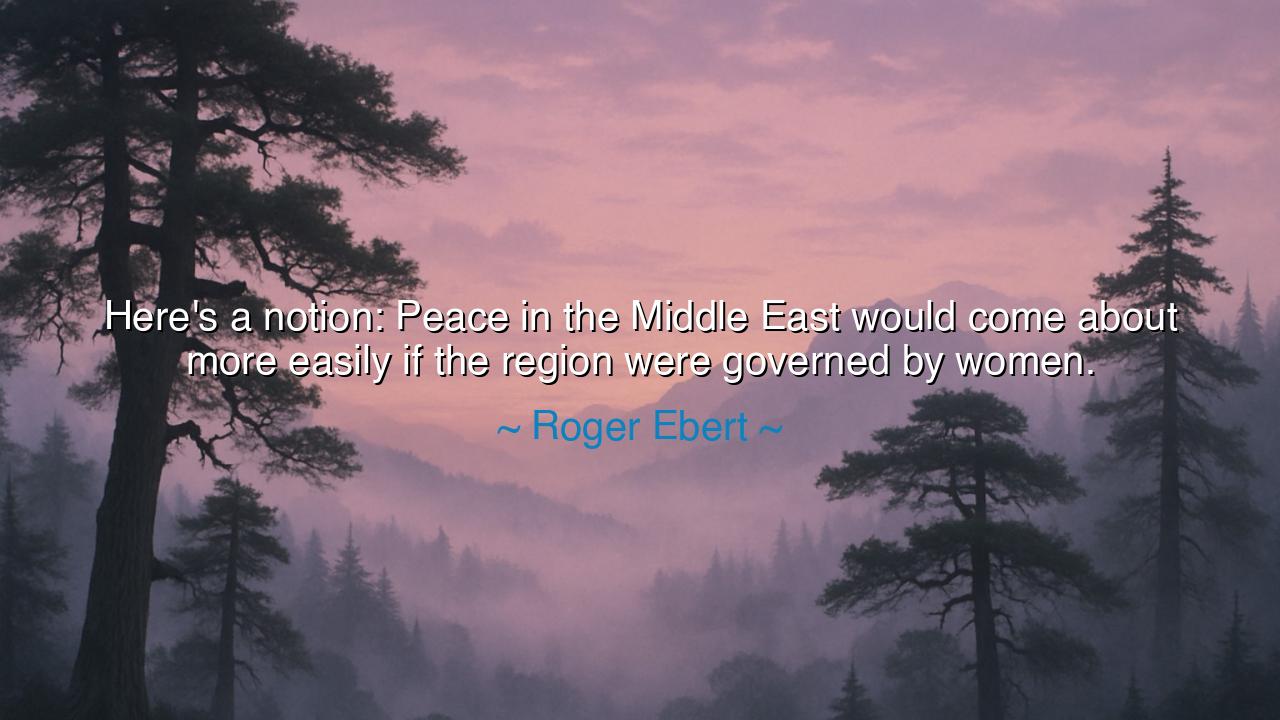
Here's a notion: Peace in the Middle East would come about more
Here's a notion: Peace in the Middle East would come about more easily if the region were governed by women.






Hear the provocative yet hopeful words of Roger Ebert, who once declared: “Here’s a notion: Peace in the Middle East would come about more easily if the region were governed by women.” These words, though said with a touch of wit, carry within them the pulse of a deeper truth: that the way of peace may not be found in the paths men have walked for centuries—paths of pride, vengeance, and endless war—but perhaps in the gentler, humbler, and more nurturing ways often embodied by women throughout history.
For peace is not born only of treaties and borders, but of the ability to see life as precious, to value the child, the home, and the simple joys of human connection above conquest or pride. In many cultures, women have been the guardians of hearth and family, the ones who feel most directly the price of war—widowhood, hunger, children lost. Ebert’s words suggest that if the voices of such guardians were raised to positions of power, perhaps the endless cycle of vengeance that consumes nations might be broken.
History offers us examples of this vision. In Liberia, when civil war had ravaged the land, it was women—led by Leymah Gbowee—who rose together, Muslim and Christian alike, demanding that the fighting end. They gathered in streets, in prayer, in protest, even confronting warlords face-to-face. Their courage forced the men of power to lay down their arms and negotiate. From this, peace emerged where diplomacy and military might had failed. Here we see Ebert’s idea alive: that women, bound by the will to protect life itself, can succeed where men driven by pride and violence cannot.
And yet, this is not to say that women are without ambition, or that men are incapable of compassion. Rather, it is to acknowledge that societies long dominated by masculine ideals of strength and conquest have too often neglected the balancing qualities of empathy, patience, and cooperation. When Ebert spoke of governance by women, he was speaking of the need for these qualities to be placed at the forefront, for leadership that listens rather than commands, that nurtures rather than destroys.
Consider also the wisdom of Queen Elizabeth I of England, who reigned in an era of turbulence. She steered her nation through wars and rivalries, yet often sought compromise where men of her court demanded blood. She declared she had “the heart and stomach of a king,” yet she also knew when restraint and patience were greater than aggression. This balance of strength and mercy reflects the very qualities that Ebert imagined could bring stability to a region like the Middle East, long fractured by rigid pride and cycles of revenge.
O children of tomorrow, take heed of this lesson: the qualities that bring peace are not bound to one gender, but they are too often neglected in favor of force. Learn to cultivate within yourself the balance of courage and compassion, daring and gentleness. Listen before you strike, nurture before you destroy, and value life above victory. If nations were guided by such virtues, the world would know less bloodshed and more harmony.
Thus, the words of Roger Ebert, though spoken as a passing notion, resound with prophetic power. They call upon us to imagine leadership not driven by pride, but by care; not obsessed with dominance, but with healing. Whether man or woman, the leader who governs with these qualities brings the possibility of true and lasting peace. And so let this be the teaching: if you desire peace, seek to cultivate within yourself the heart of a mother for her children, the wisdom of one who values life above all else—for only then will peace endure.






DMLe Duc Minh
While Ebert’s quote makes an interesting point, I’m cautious about making broad generalizations about gender and leadership. History shows that both men and women have led countries with varying levels of success, and peace in the Middle East isn’t just about leadership styles—it’s deeply tied to political, cultural, and religious tensions. Could a female-led government make a difference? Possibly, but I think there’s a need for systemic change that goes beyond gender.
VHYen Vu Hai
Roger Ebert's comment about women governing the Middle East for peace sounds idealistic but also intriguing. Do we assume that women are inherently better at conflict resolution, or is there something more to the idea of a more collaborative leadership approach? I think it’s worth considering whether leadership, regardless of gender, should prioritize empathy, dialogue, and inclusivity. Could women be better positioned to navigate complex social dynamics, or does it come down to the individuals involved, not just their gender?
HLQuang Hieu Lam
This quote from Ebert got me thinking—would the Middle East actually be more peaceful if women were in charge? On one hand, it’s easy to believe that women might approach diplomacy differently, perhaps with more emphasis on dialogue and empathy. On the other hand, peace is a complex issue with deep historical, religious, and political roots. Could the solution be more about changing entrenched systems and ideologies, rather than focusing on gender?
-H-Halia Hawara
Ebert's idea about peace in the Middle East being more attainable under female leadership is thought-provoking. I do wonder, though, if it’s more about the mindset and approach rather than gender. Could a female-led government bring a different, perhaps more empathetic perspective to the table? Or is this simply an idealized view of how women might govern, based on stereotypes of nurturing and collaboration? Can peace really be gendered, or is it about the values individuals hold?